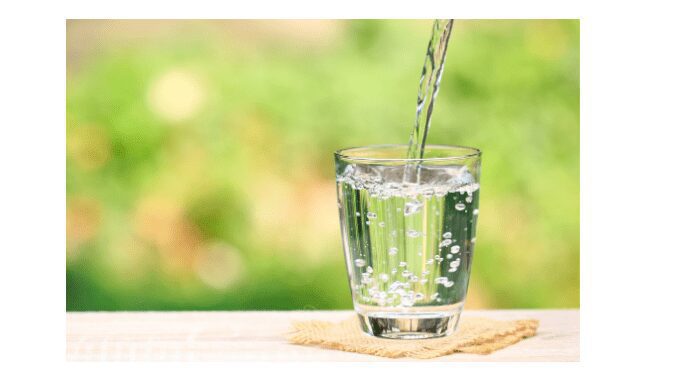
Introduction
Water is an important part of all the organisms living on earth. In fact, all the big civilizations of the world have developed around the river. This shows how much water plays an important role in our lives. We all know that carbohydrates, proteins, and fats are the major macronutrients of our body. But these all nutrients are incomplete without water. The role of water in human nutrition is around 60-90 % of the body weight needs water.
It helps in the absorption of all the nutrients and vitamins and thus drives the major metabolic activity of the body.
Terrestrial plants absorb water from the soil by root hairs and aquatic plants absorb water through the entire body surface. The human body absorbs water through various foods and vegetables. Below is a description of the need for water in the nutrition of the organisms (1).
Chemical structure of water
Water is a macronutrient made up of a combination of 2 molecules of hydrogen and molecules of oxygen. The chemical formula of water is H₂O. Although water does not produce the energy it is called macronutrients for the amount and importance of water in the body.
Water is an inorganic element. An adult male should drink about 3.7 liters of water per day and a woman should drink about 2.7 liters of water per day. Water helps in the formation of protoplasm and activation of various physiological functions (2) & (3).
Source of water in the human body
About 2/3 of the human body weight is water. The amount of water in the tissue and cells of the human body is 70%. And the amount of water in the bones is 20%. All the water is taken into the human body from some sources.
1. Water taken through liquid food
Milk, drinking water, tea, coffee, fruit juice, and other drinks, etc.
2. Water taken through solid food
Rice, fish, meat, pulses, vegetables, etc. (4) & (5)
There are some sources of food that are rich in water.
| Food sources | Amount of water (%) |
| 1. Watermelon | 92 |
| 2. Cucumber | 95 |
| 3. Strawberries | 91 |
| 4. Skim milk | 91 |
| 5. Oranges | 88 |
| 6. Peaches | 89 |
| 7. Cantaloupe | 90 |
| 8. Lettuce | 96 |
| 9. Plain yogurt | 88 |
| 10. Tomatoes | 94 |
Water balance
When the amount of water in the body is completely unchanged, that condition is called water balance. When the amount of water consumed exceeds the amount of water emitted then it is known as a positive water balance.
on the other hand, if the amount of excretion is more than the intake of water, the amount of water in the body decreases, and the condition that arises is called negative water balance. Negative water balance occurs when there is diarrhea, vomiting, sweating, excessive bleeding from the body, diabetes, and eating high-fat food. Negative and positive water balance causes various problems, and nutrition is also disrupted. So the balance of water is properly needed for the human body to be properly nourished (4).
Function of water
Water is important after oxygen to sustain life. It has an effective role in human nutrition. An essential role of water in the human body can also be observed in different cases.
1. Formation of cell component
Water is an essential component of tissue and cell formation. It plays an important role in maintaining the shape of tissues and cells. The protoplasm of each cell in the human body contains 60- 70% water.
2. Help in physiological function
Water helps in various physiological functions of the human body. Plants and animals also need water to carry out the various physiological functions of their bodies like diffusion and osmosis process.
3. Act as a solvent
Water acts as a solvent in extracellular and intracellular liquids. It also helps in transmitting nutrients to the body cells and eliminating metabolic contaminants.
4. Analyze ions
Different complex and inorganic compounds are analyzed in different ions through water and have an ionized state through the water.
5. Assist in temperature control
Water mainly evaporates through the skin and lungs and participates in the regulation of body temperature.
6. Act as a reactant
Water acts as a medium in the reaction in the hydrolysis of carbohydrates. In many cases, water also participates in metabolism as a reactant.
7. Prevent friction
Water protects various parts of the body from decay. It prevents friction between different parts of the human body.
8. Help in the digestion
Saliva is mainly composed of water. The amount of water in the saliva is 98%. This water helps in digestion by making food soft and liquid.
9. Prevent constipation
Constipation is a type of irritable bowel syndrome. This problem is seen in most people nowadays. Water is a food nutrient that helps prevent constipation.
10. Keeping the body healthy
About 95% of urine is water. With that water, the body’s waste products come out and thus keep the body healthy and provide nutrition to the body. If it accumulates in the body, there is a risk of kidney and gallbladder stones. Drinking less water than required can cause bladder disorder.
11. Act as a carrier
Water carries various substances from one part of the body to another. Food particles dissolve in water, are absorbed by countless cells in the small intestine, and enter the bloodstream. Water also helps in the transport of oxygen and carbon dioxide from the cell to the lungs and from the lungs to the tissue cells as blood components (3) & (6).
Impact of lack of water in the body
When there is a lack of water in the body, the extracellular fluids become thick. As a result, the cells become dehydrated or dry as water escapes from the inside of the cell. Diarrhea, excessive vomiting, drinking not enough water, and drinking too much salty water, etc. can cause dehydration.
Lack of water in the body causes various problems such as an increase in thirst, an increase in the thickness of extracellular and intracellular juice, and an increase in body heat. At this time blood pressure decreases and blood circulation is disrupted.
Besides, the skin becomes dry and wrinkled, there is the weakness of nerves and muscles, fatigue, increased tendency of acids and disorientation, etc. occur (1).
Effect of increasing the amount of water in the body
Several problems in the body arise if the amount of water in the body increases for any reason
- As the amount of water in the body increases, the extracellular fluid becomes thinner and more water enters the cells.
- Excess of water in the body causes metabolic disorders.
- Other problems that occur when the amount of water in the body increases are loss of body temperature, limb pain, pain in muscles, abnormal movement of the heart, loss of consciousness, etc. occur (3) & (5).
